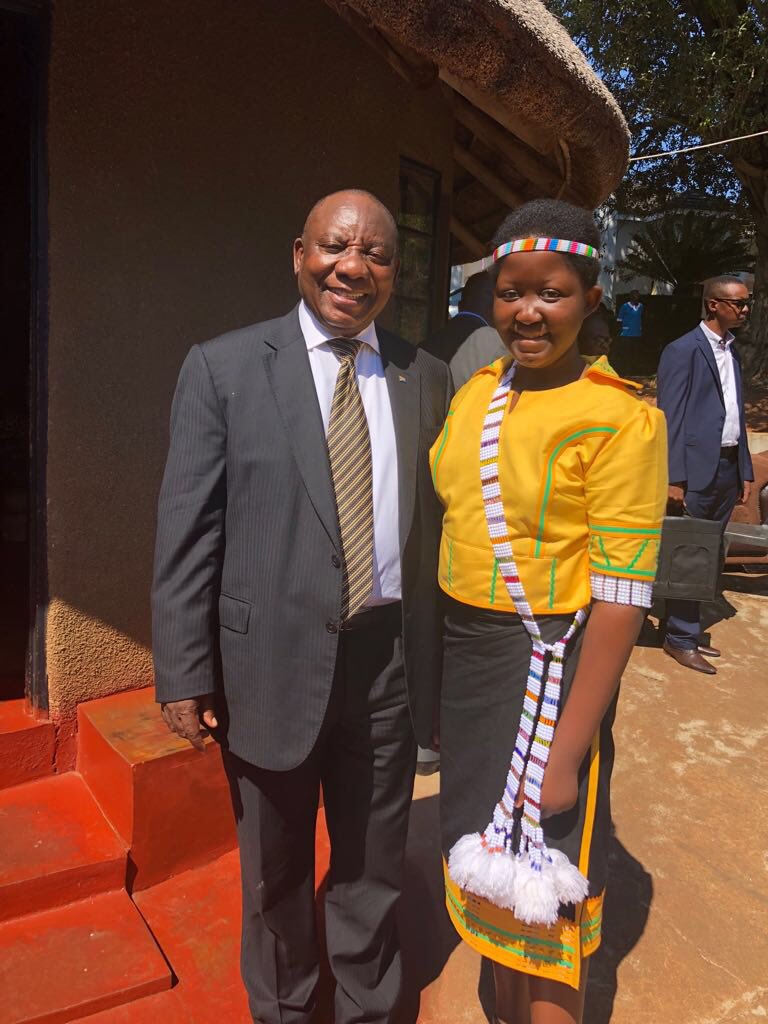Traditional leaders have a crucial role to play in building a society free of poverty, unemployment and inequality.
Khelobedu could become a 12th official language for South Africans in line with resorting dignity of traditional leadership.
 This was according to President Cyril Ramaphosa when speaking at the coronation ceremony of the Queen of Balobedu at Mokwakwaila Stadium in Bolobedu, Ga-Modjadji in Limpopo.
This was according to President Cyril Ramaphosa when speaking at the coronation ceremony of the Queen of Balobedu at Mokwakwaila Stadium in Bolobedu, Ga-Modjadji in Limpopo.
President Cyril Ramaphosa promised to make Khelobedu an official South African language during his address.
Khelobedu is a language spoken by the Balobedu tribe which the 13-year-old Balobedu Rain Queen elect, Masalanabo Modjadji, will take over when she turns 18, after being installed as Queen Modjadji VII.
She will graduate in terms of the Balobedu customs and traditions.
“This is a true historic milestone that Mama Winnie Madikizela-Mandela would have been proud of. This is the first and only queenship in the country and on the continent,” said President Ramaphosa.
President Ramaphosa reaffirmed government’s commitment to the restoration of the honour and dignity of traditional leadership.
The Balobedu Queenship was officially recognised in March 2016 after the Commission on Traditional Leadership Disputes and Claims (CTLDC) conducted research on the status of the Balobedu, as per the claims submitted to the CTLDC.
It is the first Queenship in the Republic of South Africa.
“Government is committed to giving effect to the provisions of Chapter 12 of the Constitution, especially the restoration of the dignity of the institution of traditional leadership in a Constitutional democracy,” said the President.
He said the recognition of the Queenship in South Africa demonstrates the commitment to the principle and value of gender equality, while also recognising the leadership role that women play in all spheres of life.
“This is truly a historic milestone in the democratic South Africa that we live in today,” said the President, adding that the occasion was also an affirmation of the vital role that traditional leaders play.
“Traditional leaders have a crucial role to play in building a society free of poverty, unemployment and inequality. Our traditional leaders need to be at the forefront of the struggle to restore rights and dignity of our people.”
He further stressed the important role they play in restoring land to the right owners.
“They need to ensure that the land is restored to those who work it and that those who the land is returned to have the means to work it,” said President Ramaphosa.
He said traditional leaders have an important role to play in the development agenda of South Africa.
An estimated 25 million people, who live in rural areas, do so under the leadership of traditional leaders.
The President was accompanied by former President Jacob Zuma, Cooperative Governance and Traditional affairs (COGTA) Minister, Dr Zweli Mkhize, Limpopo Premier Stanley Mathabatha, traditional leaders and church leaders.
Did you know?
- The Balobedu were some of those who were affected when in 1972 the then Rain Queen Makoma Modjadji was stripped of her powers and reducing her title to that of chieftainness.
- Villages and indunas under her jurisdiction were incorporated into the Lebowa and Gazankulu homelands, consequently destroying the rich cultures and the lineage of the queen dating back over 400 years.



 Facebook
Facebook Twitter
Twitter WhatsApp
WhatsApp